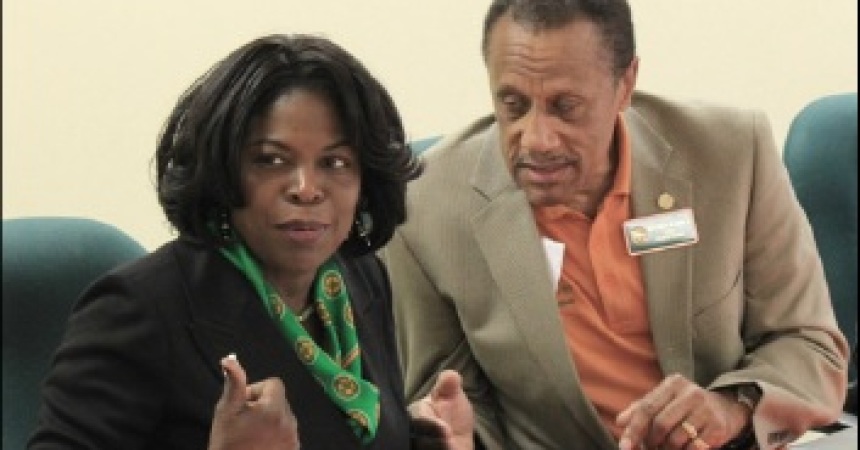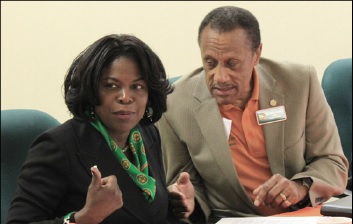
Trustees Voice Desire to Keep 30-year Joint Engineering Program
By Keytron Hill
Outlook Writer
The topic of marriage and not a divorce was the presiding factor discussed at Florida A&M University’s (FAMU) Feb. 6 trustee board meeting regarding the split of the joint FAMU-FSU College of Engineering (E-College).
Some issues discussed included the lack of funding that has been attributed to FAMU and its professors; the organization structure of the engineering school and the academic success of FAMU students, specifically in mathematics.
“Today’s meeting is a special meeting that was called to give you an opportunity, as trustees, to provide us with feedback on your thoughts about the CBT report. It gives us an opportunity to have a discussion as we continue to engage with Florida State University, the (Florida) Board of Governors and others around the disposition of FAMU’s position,” said FAMU President Elmira Mangum.
The CBT report is a 91-page report completed by the Sacramento, Calif., firm Collaborative Braintrust Consulting Firm. The firm was hired by Florida’s Board of Governors to study the joint engineering program after former Florida Sen. John Thrasher recommended the E-College be divided among the two institutions during last year’s legislative session when he led a budget amendment. Thrasher is now Florida State University’s president and the Feb. 6 meeting was the first time one of institution’s trustee board’s spoke publicly about the CBT report.
Trustee Lucas Boyce broke the ice, introducing the issue of FAMU’s enrollment decrease in the E-College. Page 66 of the CBT report highlights the cons behind separating the engineering program. The third bullet states that enrollment from FAMU has dropped 46 percent from 2003 to 2013.
Professor and Associate Dean of FAMU-FSU E-College Reginald Perry offered a solution that he felt could improve enrollment.
“One of the things that we are recommending is that there needs to be more faculty on the FAMU side,” Pery said. “Right now, there are probably about 80 faculty members at the college and only 24 are on the FAMU side. What we would like to see is doubling the amount of FAMU faculty.”
Perry added, “The other thing we recommended (is) getting a recruiter dedicated to the college of engineering, we would like to see someone dedicated to helping us recruit.”
Perry admitted to having 10 recommendations that would strengthen the presence of FAMU at the college of engineering and would make the partnership more collaborative.
One of Perry’s recommendations included meeting with the dean of the College of Sciences, the chair of the math department, and all of the engineering chairs to discuss the next steps on improving the students of the E-College’s math skills.
“The problem is we have shown that if the students can finish their prerequisites that we have in engineering – the math, the physics, the chemistry, which is what we call a freshman engineering lab – the success rate for both FAMU and FSU would be about the same. There’s no difference,” said Dean of E-College Yaw Yeboah.
Yeboah added, “The problem is we are recruiting students in engineering who have no mathematic background.”
Trustee board member Bettye Grable turned everyone’s attention to the faculty.
“We have to remember that the people who are on the frontline here are the faculty. And our faculty has a history of knowing exactly how to reach and teach even students that others may consider not valuable in some cases or those who are underrepresented,” Grable said. “And that is our stock and trade. That is our brand. We must support the faculty in terms of this report’s comments on salaries and fairness and the promotion in tenure criteria.”
Kamal Tawfiq, chair and professor of the FAMU-FSU civil and environmental engineering, described getting a call from a student who assumed he would be happy about the split, because the student believed all of his professors were from FSU.
“That suggests a potential avenue we may want to pursue. When we look at the report, it states under the historical review that FAMU had a growing – that’s a key word, growing – bachelor degree program in civil and electronics and technology. Somehow students need to be aware of who they are communicating with in the classroom,” said Grable.
Yeboah believed it was a good thing that the professors of engineering don’t make distinction between professors from neither school.
“I deal with FSU. I deal with FAMU equally. For us in the college we don’t make distinctions and that’s good,” said Yeboah.
Trustee Kelvin Lawson wanted to know how FAMU planned to engage Thrasher and influence the governors on their point of views. He was also concerned about the funding that would be needed to successfully follow the plans Perry set forth.
Mangum admitted to having lunch with officials and Thrasher, discussing the organizational issues and how FAMU can improve its partnership.
“Some of it relates to our willingness and readiness and being able to cooperate and honor the joint agreement that currently exists. It also means us developing a new set of standards by which we engage each other around the joint college. Going forward, we are talking about the administrations of both institutions getting together to revisit the joint agreement,” said Mangum.
When asked what does she feel will happen to the students of engineering if the split were to take place? Mangum responded, “We are not the underdogs in this situation, we are The Florida Agricultural and Mechanical University. Don’t even think like that.”








